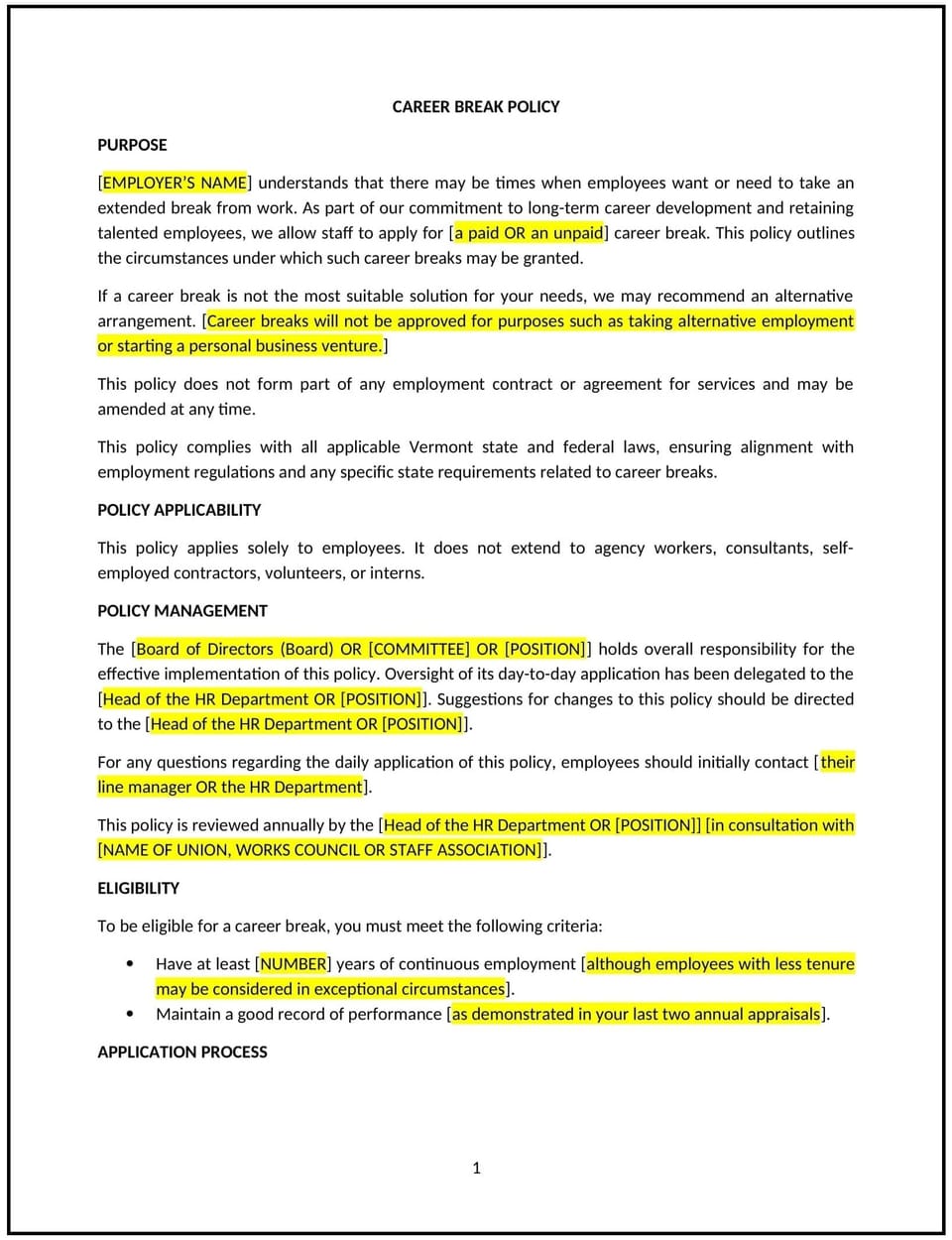Career break policy (Vermont): Free template

Career break policy (Vermont)
This career break policy is designed to help Vermont businesses provide employees with the opportunity to take an extended period of unpaid leave for personal or professional growth. It outlines eligibility criteria, the application process, and guidelines for managing career breaks while maintaining compliance with Vermont employment laws.
By adopting this policy, businesses can support employee well-being, enhance retention, and promote work-life balance.
How to use this career break policy (Vermont)
- Define eligibility: Specify which employees qualify for a career break, such as those with a minimum length of service or a proven track record of performance.
- Establish valid reasons: Outline acceptable reasons for a career break, such as pursuing education, personal development, caregiving responsibilities, or travel.
- Include application procedures: Require employees to submit a formal request for a career break, including details of the intended duration and purpose.
- Set duration limits: Specify the maximum allowable length of a career break and any conditions for extensions.
- Address role security: Clarify whether employees are guaranteed their current role, a comparable role, or no role upon return.
- Define benefits and compensation: Explain the impact of a career break on benefits, seniority, and continuity of employment.
- Outline return-to-work procedures: Provide steps for employees to notify the company of their intent to return and for reintegration into the workplace.
- Monitor compliance: Regularly review and update the policy to ensure alignment with Vermont laws and organizational goals.
Benefits of using this career break policy (Vermont)
This policy provides several benefits for Vermont businesses:
- Supports retention: Encourages employees to stay with the company by offering flexibility for personal or professional growth.
- Promotes work-life balance: Demonstrates the company’s commitment to supporting employees’ diverse needs.
- Enhances engagement: Allows employees to pursue meaningful activities, returning with renewed focus and motivation.
- Provides structure: Establishes clear guidelines for managing career breaks, minimizing disruptions.
- Aligns with legal requirements: Strengthens compliance with Vermont employment laws regarding unpaid leave and workplace rights.
Tips for using this career break policy (Vermont)
- Communicate the policy: Share the policy with employees during onboarding and make it accessible in the employee handbook.
- Promote fairness: Apply the policy consistently across employees to ensure equity.
- Plan for coverage: Develop strategies to manage workloads during an employee’s absence, such as cross-training or temporary hires.
- Encourage open communication: Foster a dialogue where employees feel comfortable discussing their career break needs with HR or management.
- Update regularly: Revise the policy to reflect changes in Vermont laws, workplace dynamics, or business needs.
Q: Who is eligible for a career break under this policy?
A: Eligibility depends on factors such as length of service and performance history, as outlined in the policy.
Q: What are acceptable reasons for taking a career break?
A: Acceptable reasons include pursuing education, personal development, caregiving responsibilities, travel, or other significant personal needs.
Q: How long can a career break last?
A: The maximum duration is specified in the policy, typically ranging from a few months to one year, with potential for extensions under certain conditions.
Q: Will employees retain their job during a career break?
A: The policy will clarify whether employees are guaranteed their current role, a comparable role, or no role upon return, depending on business needs.
Q: Are benefits maintained during a career break?
A: Benefits may be paused or adjusted during the break, as outlined in the policy, and employees should consult HR for specific details.
Q: How should employees apply for a career break?
A: Employees must submit a formal written request, including the proposed start and end dates and the reason for the break.
Q: What happens if an employee decides not to return after a career break?
A: Employees should notify HR promptly if they choose not to return, and standard resignation procedures will apply.
Q: How often is this policy reviewed?
A: This policy is reviewed annually or whenever significant changes occur in Vermont laws or workplace practices.
This article contains general legal information and does not contain legal advice. Cobrief is not a law firm or a substitute for an attorney or law firm. The law is complex and changes often. For legal advice, please ask a lawyer.


